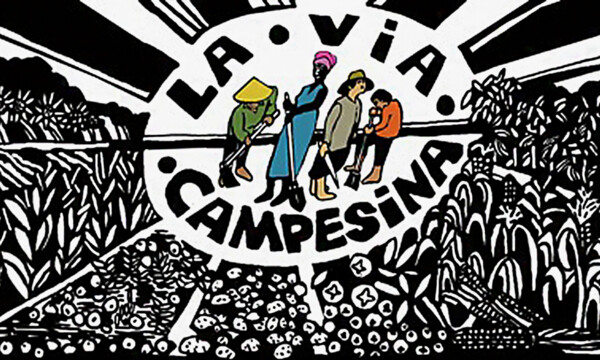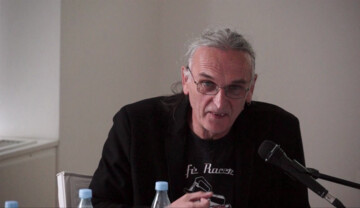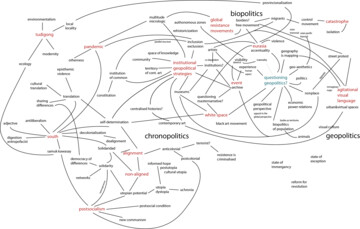The geopolitics of the contemporary social movements: global resistance
It is quite a challenging task to propose a workable sub-category to the seemingly “outdated” term of “geopolitics”. Even more so, because this term was never a genuine part of the lifeworld, or Lebenswelt, of the → commons and its ethical and aesthetic layers. Looking at the maps of the current crisis, for instance at the borders of Syria – and the same can be seen on other maps of war-torn countries, which are mainly located beyond our conformity – we can see straight borderlines which are cutting into the real geography and demographics of broad landscapes. These borders were obviously created with rulers and by rulers, located somewhere far away, in the “metropolis” of the world.
Geopolitics crystallised itself as a clear idea in the times of imperialism at the break of 19th and 20th centuries. The colonial hegemony over the vast “un-ruled” and “non-Modernised” geographies has long been the driving ideological and practical force behind the Western nation states who shaped the idea of geopolitics and its practice of subordination of “outer” space. This was also the cause of the “inner” international conflicts they ran and run among themselves. “Internationality” is, therefore, a result of these historical hegemonic restructurings. The periphery and “outer” space (Central Europe, for instance) comprehends this “inter-nationality” mainly as inter-ethnicity, on the basis of their Romantic post-1848 revolutionary counter-hegemonism, which was established on the mythological construct of Volksgemeinschaft (people’s community), and exists now as a raw nationalism. Hence, there was no geopolitics without national hegemonism.
On the other hand, geopolitics is not only a concept of hegemonic practices, but also a vocabulary item, a word. Even though we usually identify words with concepts, there does not exist such an identity; the related concepts, ideas or ideologies just stick themselves on words like various Post-it notes. If there obviously are no body-snatchers outside fiction, the matter is different with word-snatching, which is a common practice in ideological warfare. Let’s take for example the neoconservative use of the term “revolution”, which has been used in the opposite sense to that which social revolutionaries apply it, namely as a “counter-revolution”.
This fact, which from the word creates a refrigerator surface for Post-it notes, liberates us and opens a possible path for deliberation and experimentation. The stickers we propose could easily be discarded, but in spite of our intellectual playfulness, we hope they would stick in the public mind, just like a meme that is at first posted like a marginal or casual entry on YouTube. This should be the starting point in our non-imperialistic snatching of the word “geopolitics”, and thus creating new connotations for the term, which are more appropriate for our non-systemic and utopian lifeworld.
The possibility for such a game emerges from the changing image of capitalism, which nowadays is hard to identify with the above-mentioned imperialism from a century ago. Now we are witnessing the formation of a globalised web of elusive hegemonic power, which consists of rapid global movements of capital. The term “capital” here has to be understood in the form of subordination, and not in a strict economic sense. It has been signified by “precarity” as a new regime of work, and by the moving of industry to places where life is generally cheaper (because of violence, lack of affordable cultural and health resources, and the absence of social security). Because of the falling profit rate and the threat of crisis, capital circulation now embodies itself mainly as an evasive flux of financialisation. The role of the nation state, therefore, differs to the extent that we can now talk about the end of nation states and the constitution of some other type of sovereignty.[1] That does not mean that this a-centric and uncatchable force is not internationally or informally institutionalised. The subordination of Greek democracy by the informal Eurogroup in the summer of 2015 is a clear example of this questionable structural force, where it was obvious that “national” financial ministers were representing a set of hidden financial institutions (like hedge funds, for instance), and not their respective “democracies”. This also does not simply mean that the nation state has already perished. It only changed its nature.[2] All these changes have been fostered and accompanied by a new ideological belief, which we’re now calling “neoliberalism”. Contrary to the common image, this is not an economic theory, which could adapt to argumentative or empirical processes, but is instead a new kind of religious dogma, which was adopted by the ruling elites to such an extent that they had to snatch the word “revolution” to describe this turn and change its sense to nonsense.
In the background there also exists an epistemological question. This is the question of a pre-theoretical position, which has been erased from the horizon of mainstream social science and humanities in the name of a self-proclaimed and never seriously reflected “objectivity”. It is obvious that mainstream scholarship strives to achieve “scientificity” by imitating the procedures of the natural sciences and proclaiming this imitation as the adoption of “objective methods”. The absence of the position of the narrator and proclaiming this as “objectivity” is doubtful, because he is nevertheless still inside of the observed and researched media. In contrast, we – as → reflexive researchers – are involved in the praxis, which demands clarification of our position. Far away from the postmodernist scepticism and relativism, which approves all possible standpoints[3] and destroys all hierarchies of the narrated, we have to act consciously from within in our claims to the truth or justice. The well-known example is (or should be) Marx’s decoding of capital in the terms of → labour force, which was previously, in the classical political economy, misunderstood or conceived only as accumulated work. In other words: the changed position of analysis, this time from the standpoint of the proletariat, enabled the decoding. Such partisanship was the precondition for “objectivity”, or so-called scientific “truth”.
So, where does this arrogant self-consciousness of mainstream scientists come from, and what are their presuppositions?
There is an easily observable ideological mechanism: such an “empiric methodology” supports a non-reflexive and non-critical attitude towards social phenomena. They are not conceived within the dynamics of social changes and struggles, within their historic transitions, but instead like a factum brutum, which has to be entered into some methodological scheme, and from which “scientific” results about their inter-relations have to be achieved. This kind of social science hides its epistemological presuppositions in the self-evident banality of empiricism. It seems they do not need any kind of theoretical legitimacy. Deleuze characterised such non-conceptual “science” as “marketing”[4], which is convenient for predicting the past.
Beside this ideological production of a blind spot, there is also the issue of force, which gives to scientists the confidence to name the banality of counting as the truth. Pre-modernity relied on a similar force with God’s will, which was supported by the institution of the medieval Church. In the era of secularisation, God and Church were exchanged for Reason and State. Like art, science could also be understood within such a disposition, which constitutes subjectivity. There are mechanisms and hierarchies, that are shaping our beliefs into science so that the resulting “scientific truth” relies not only on discursive force (scientific articles), but also on ritualised practices and the sheer institutional force given by the state and other bearers of power. They turned to the dark side. This is the force which liberates scientists from the responsibility to clarify their social position within research on society. This self-confident arrogance has been sponsored by the state, and outside such (i)rationality, for us, remains only the way of marginalisation. Hence, from this standpoint, even the fashionable changes in mainstream art or science are not at all coincidental.[5]
Now, haven’t we concluded, that national state, in its Hegelian broad sense, is today perishing and giving way to the new, flexible global sovereignty? This one-sided globalisation, as a part of neoliberal faith, is connected with the actual reduction of Reason (the second secularisation) to everyday economic reasonability and the equating of social science with primitive empiricism.
Regarding this, the gaze of mind (theoria) now has to change its perspective, which is nothing new in history, let’s just, for instance, compare the positions of Plato and Aristotle on the one (aristocratic) side with Diogenes or Stoics on the other. If Marx took the position of the proletariat to decode the enigma of capital, then we have to choose a similar position to save the theoria within the realm, which is eminently praxis (normative and not “objective”). Well, the position of the proletariat is surely considered outdated today, but this is largely a misconception of Marx’s notion. The contemporary rise of cognitive and affective work and displacement of industrial production into the Third World could not be the conclusive argument, because Marx never identified the proletariat with a sociological class of industrial workers, but with a position in relation to capital accumulation. Even in The Communist Manifesto he noted that lawyers and the men of science are also being proletarianised.[6] Nevertheless, the resistance to global neoliberal capitalism has changed accordingly.
This means that this resistance and the processes of → emancipation have (and had) to change their terrain and modes of action. They must globalise, not in the sense of internationality, but in the sense of trans-nationality. But what are these new emancipatory subjectivities capable of confronting the geopolitics of evasive capitalism? We can identify them, at least from the end of the 1990s, in the new, as a rule, grassroots, social movements. Contrary to the beginning of the 20th century, these movements are not and should not be hierarchical and authoritarian, or aiming to conquer the state apparatus to rule and change society from above.[7] They even do not need to be an organisation. They are just multiplicities of initiatives and struggles. Initially, they emerge from the lifeworld and commonly have anti-systemic connotations. Be it identity politics (ethnic identity rights or LGBTQ issues, for instance) or class struggle, environmentalism or the free movement of migrants and refugees, peace politics or a sustainable economy, and so on, these all constitute a non-hierarchical conglomerate of the contemporary global resistance. We can grasp it through Adorno’s micrological thought, which prevents dialectical reconciliation in its totality. In his negative dialectics, the reconciliation is a “meditation on the no-longer-hostile multiplicity”[8]. We can refer to the Negri’s and Hardt’s notion of the multitude. We can be anarchists. We can go to Chiapas or Rojava to educate ourselves on the examples of revolutionary communal experiments. There are even more possibilities to understand these heterogeneous emancipatory multiplicities, and limitless possibilities to actively join up. Of course, the changed pluralistic points of resistance are also changing the epistemological viewpoints. It does not matter that the suppressed, mainly colonised, epistemologies have to be recognised in a renewed hegemonic exchange, which would refute all the heritage of Western reason. Each narration, which is meaningful within the plurality of a resistant multitude, creates the heterogeneity of contemporary reason, which should be conceived of as a net, and the result of networked resistance. It should be stressed, however, that resistance here is not the faith and expectation of some future ideal state of the world, but emerges from real experimentations of real worldly practices confronting and replacing the ruling systems of life (exploitation, ecological degradation, patriarchy, homophobia, post-colonialism, migration management, commercialism, etc., etc.).

La Via Campesina, International Peasant’s Movement logo.
After two decades of such networked global resistance the question frequently arises of its impacts. Through the mainstream media, but also through the numerous defeats, it seems that the global neoliberal rule is invincible. But within the lifeworld, even defeat should become a valuable experience. Moreover, the forms and pace of resistance are even faster than the rule of postmodern capital. We have established → networks on the internet, but also in real life. Some such networks, for instance, La Via Campesina (Figure), are today the biggest transnational global social networks. If they are not present in the public consciousness of the Western hemisphere, because of corporate media censure, then all the worse for the West. From alter-globalisation protests to the global and local social forums, from the Occupy movements to the anti-austerity actions – all these forms of resistance consist of vivid heterogeneous subjectivities, initiatives, and topics. This is life-experience, which counts and persists in spite of violent systemic pressure. The exodus prevails, despite death and suffering.
Still, there’s an open question within movements of resistance. Do we also need to constitute an alternative or parallel structure? A structured counter-power? Non-hegemonic provisional hierarchy? Are non-formal networks immune to informal hierarchies and egotisms? Is it possible to formulate a minimal → common platform? How can we neutralise the nation state-oriented leftists, who were imposing themselves on social forums and anti-austerity movements? How can we confront the hijacking of our actions and media? What’s the role of self-defence? What are the limits of non/violence?
In this regard, the micropolitics of global resistance not only confronts but also transcends the seemingly homogenous neoliberal block of contemporary geopolitics, and is an important if not decisive point for a renewed understanding of geopolitics beyond the hegemony of powerful. The contemporary multitude of social movements, their propositions and struggles, are already shaping the geopolitics of a world brought in peril by the lemmings of capital.





